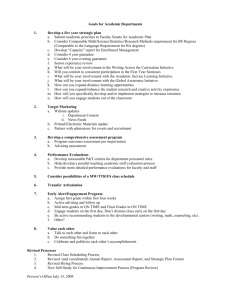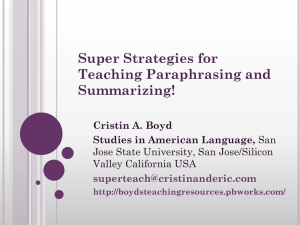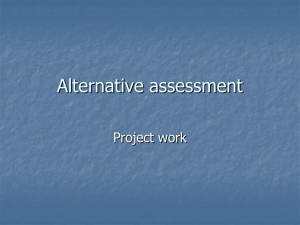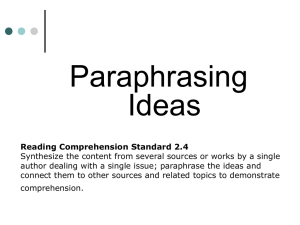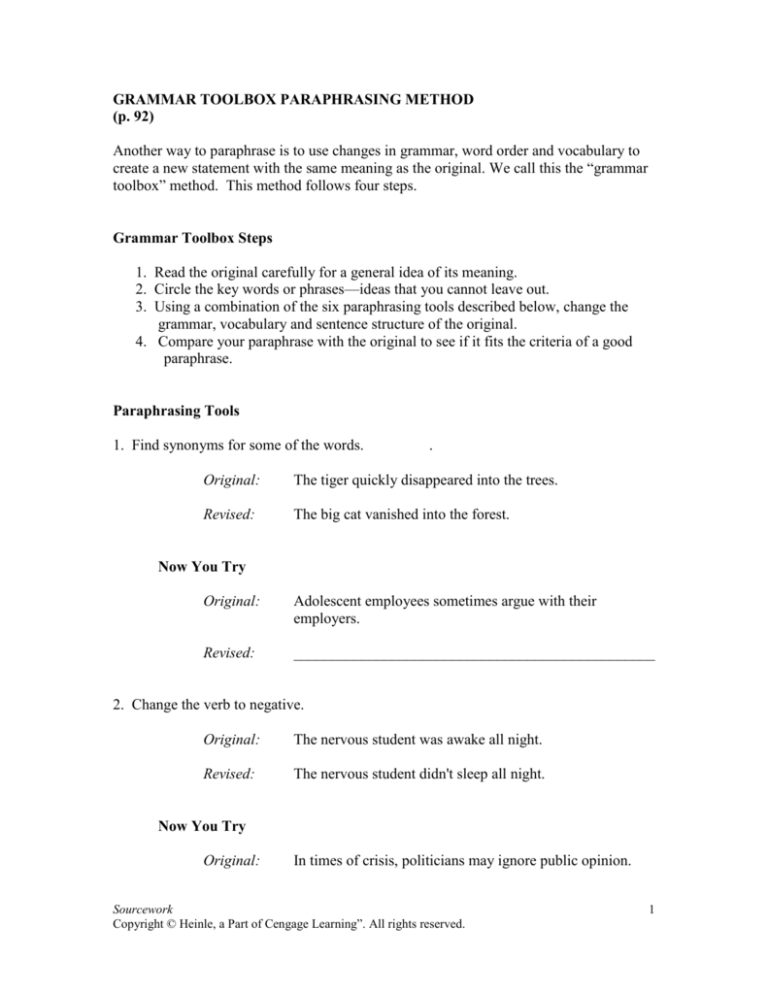
GRAMMAR TOOLBOX PARAPHRASING METHOD
(p. 92)
Another way to paraphrase is to use changes in grammar, word order and vocabulary to
create a new statement with the same meaning as the original. We call this the “grammar
toolbox” method. This method follows four steps.
Grammar Toolbox Steps
1. Read the original carefully for a general idea of its meaning.
2. Circle the key words or phrases—ideas that you cannot leave out.
3. Using a combination of the six paraphrasing tools described below, change the
grammar, vocabulary and sentence structure of the original.
4. Compare your paraphrase with the original to see if it fits the criteria of a good
paraphrase.
Paraphrasing Tools
1. Find synonyms for some of the words.
.
Original:
The tiger quickly disappeared into the trees.
Revised:
The big cat vanished into the forest.
Now You Try
Original:
Adolescent employees sometimes argue with their
employers.
Revised:
________________________________________________
2. Change the verb to negative.
Original:
The nervous student was awake all night.
Revised:
The nervous student didn't sleep all night.
Now You Try
Original:
In times of crisis, politicians may ignore public opinion.
Sourcework
Copyright © Heinle, a Part of Cengage Learning”. All rights reserved.
1
Revised:
________________________________________________
3. Change voice: Make active sentences passive and passive ones, active.
Original:
The voucher was sent by the testing service on August 3rd.
Revised:
The testing service sent the voucher on August 3rd.
Now You Try
Original:
Dieting can cause poor nutrition.
Revised:
________________________________________________
4. Change parts of speech: Change nouns into verbs, verbs into nouns, etc.
Original:
The teacher helped the student finish her class registration
form.
Revised:
The teacher helped the student register for classes.
Now You Try
Original:
Everyone danced at the graduation party for hours.
Revised:
________________________________________________
5. Combine sentences: Use new connecting words to combine shorter phrases and
sentences.
Original:
Paraphrasing is a skill students need to learn. It is an
important part of academic writing.
Revised:
Paraphrasing, which is a skill students need to learn, is an
important part of academic writing.
Sourcework
Copyright © Heinle, a Part of Cengage Learning”. All rights reserved.
2
Now You Try
Original:
The movie was shot in New York City. Many actors choose
to live in New York.
Revised:
_______________________________________________
6. Move phrases: Move parts of a sentence to change the sentence structure.
Original:
Yesterday, I stayed in the library until midnight and
finished my homework.
Revised:
I finished my homework at midnight in the library
yesterday.
Now You Try
Original:
In order to fight a damaging disease, the farmers began to
grow genetically modified crops.
Revised:
________________________________________________
Sourcework
Copyright © Heinle, a Part of Cengage Learning”. All rights reserved.
3
ACTIVITIES TO PRACTICE PARAPHRASING
Activity One
Practice using the various tools from the Grammar Toolbox method to rewrite the
sentences below.
1. The president spoke to the angry crowd, hoping to pacify them.
2. An architect has to be able to envision the buildings she or he designs.
3. He always tries to dominate the conversation so it’s difficult for anyone else to talk.
4. In spite of the strong wind that blew in the window, everything on my desk is still
intact.
5. It is not easy to find a homogeneous group of students because all students have
different backgrounds and different ideas.
Activity Two
Use this activity to practice the Grammar Toolbox method with your classmates.
1. As a class, select three or four sentences from your source(s) and write them at
separate places along the top of the chalkboard.
2. Discuss the meaning of each quote.
3. Divide the class into groups so that there are enough groups for each to work on one
of the quotes.
4. With your group, select one “tool” from the grammar toolbox method. Rewrite the
quote, using the technique. Next to the rewritten sentence, write the tool your group
has used.
5. Once the groups have finished, each should move to a quote they have not worked on.
6. Read the rewritten sentence and select a different “tool” to change the sentence yet
again. Write the newest version of the sentence below and write the “tool” your
group has used.
7. Repeat this process until three or four tools have been used to change the original
sentence.
8. As a class, evaluate each of the final paraphrases.
Sourcework
Copyright © Heinle, a Part of Cengage Learning”. All rights reserved.
4
Example
Original:
Although the instructor was considered difficult by many students,
she was very popular.
1. Change voice (passive to active)
Although many students considered the instructor difficult, she
was very popular.
2. Word substitution
Although many students thought the teacher was challenging, she
was liked by everyone.
3. Change connecting words
Many students thought the teacher was challenging, yet she was
liked by everyone.
4. Change voice (passive to active)
Many students thought the teacher was challenging, yet everyone
liked her.
Activity Three
This is a homework variation of Activity Two
1. Select a sentence from your source to paraphrase. Write this sentence at the top of
your paper.
2. Use one paraphrasing tool to change the original sentence. Write the modified
sentence and the name of the tool directly below the original sentence.
3. Choose a second paraphrasing tool to change this modified sentence. Write your
newest version of the sentence directly below with the name of the tool you have
used. (See example above).
4. Repeat this process one or two more times.
5. Evaluate your new paraphrase. Is it grammatically correct? Have you added or
deleted ideas?
6. Bring your paraphrase to class to share.
Sourcework
Copyright © Heinle, a Part of Cengage Learning”. All rights reserved.
5
Activity Four
This activity is useful when the class is reading the same article.
1. With your group, select two or three sentences from the article to paraphrase.
2. Using the “Tell a Friend” technique or the “Grammar Toolbox” method or a
combination of the two, rewrite the passages you have selected.
3. Evaluate your paraphrases.
4. Trade your paraphrases with another group.
5. Read the other group’s paraphrases and see if you can identify the original passages
in the article.
Sourcework
Copyright © Heinle, a Part of Cengage Learning”. All rights reserved.
6

